- Home
- Alison Booth
The Philosopher's Daughters Page 2
The Philosopher's Daughters Read online
Page 2
‘But you are. That’s how I feel about music.’ She wanted to continue but there was no time; her father and Charles Barclay had caught up with them.
‘Charles tells me you’ve just returned from New South Wales,’ Sarah’s father said to Henry.
‘Queensland too,’ said Henry.
‘We mustn’t forget Queensland,’ her father said, smiling. ‘Would you like to come to tea next Sunday and tell us all about it?’
‘I’d be delighted to.’ Henry spoke with such haste that he almost stammered the words.
‘Charles can show you where we are.’ Sarah’s father shook Henry’s hand and then gave her his arm. She turned once, when they had gone ten yards, and saw Henry watching them as they walked down New Cavendish Street towards Bloomsbury. She nodded at him and he waved back.
She couldn’t wait for next Sunday.
Chapter 2
Of Sunlight Slanting through Eucalypts Like Messages from God
The grandfather clock struck the quarter hour before four. Sarah sat for a moment on the sofa opposite the fireplace and smoothed the folds of her dress, before jumping up again to check her reflection in the mirror over the mantelpiece. Harriet had said the dark blue velvet suited her. But perhaps it was too severe; perhaps it emphasised her pallor. She looked critically at her face. It was too oval and her upper lip too short. She pinched her cheeks to redden them.
Next she glanced around the drawing room, wondering how it would appear to Henry Vincent. The furnishings were a little shabby, although the proportions of the room were fine. She loved the deep red walls, the ornate ceiling cornice and the skirting board that was easily a foot deep. One window overlooked the communal gardens behind the house. The trees were mere skeletons and the lawn looked unkempt. The laurel shrubbery was so darkly absorbent that it appeared to bleach the sky of all colour although it had been a vivid blue only an hour before.
Maybe Henry wouldn’t turn up with Charles. He might forget. Or, even if he did remember, she might have imagined what had happened between them at the WFL meeting. She’d spent much of those five days struggling to suppress her excitement and was convinced that time had slowed down.
Once more she went to the mirror. She looked so pale. She pinched her cheeks again, and then wondered if she might have overdone it. Five minutes to go. She sat down in an armchair and tried to keep still.
‘All alone?’ said her father, appearing at the door. ‘I thought Harriet would be here too.’
‘She’s out walking with Violet. I’m sure she’ll be here soon. She promised.’
A bell pealed and Sarah’s stomach lurched. She heard Rose’s footsteps followed by the click of the front door. She imagined Rose staring suspiciously at Henry, as she always did with any newcomer. But he must have passed muster, for Rose was beaming as she opened the drawing-room door and ushered in Henry and Charles Barclay.
At first Sarah didn’t dare look at Henry, for she knew that she was blushing. Instead she focused on Charles. Dressed in a dark suit and with his black hair parted austerely in the middle, he might have been attending a funeral. His set expression was probably because Harriet was not yet here; it was really too bad of her to be late. Then she noticed that Henry was regarding her intently. As she gazed back she felt a deeper blush suffuse her neck and cheeks, and her heart became a thumping thing in her throat.
At this moment he bolted towards the chair next to her. Although he knocked into Charles, he didn’t allow his apology to slow him down. Once seated, he stared at his hands, awkwardly clasped on his lap. Charles sat next to her father, an amused expression on his face that she barely registered.
She saw how the lighting illuminated the planes of Henry’s face and his golden skin. He seemed almost tongue-tied, although Father had just asked him a question about the move towards federation of the various Australian colonies. Fortunately, at its second repetition, Henry seemed able to respond, but her own powers of concentration had vanished and all she heard was the lovely timbre of his voice. After a while she wondered if he was going on for too long. Knowing her father disliked people who blathered, she interrupted the flow to say, ‘Do you play the piano, Henry?’
He looked at her with a grateful expression, and explained that, although he played, he wasn’t very good. In a couple of minutes, they were sitting side by side on the long piano stool and playing the duet by Fauré.
Henry’s fingernails were cut short, like hers, so that as he played she didn’t hear the clicking of nail on ivory, a sound she hated; it so destroyed the quiet passages. He played with feeling, though not always accuracy. She decided that she was technically more proficient, before abandoning herself to the music. They were going too fast, she knew, but she felt overcome with the thrill of the passage. The faster she went, the faster he went; she was unsure quite where they were heading. At last they finished the piece and she was almost shocked to realise that she was sitting on a piano stool in a London drawing room. She turned to look at him. His pupils were dilated and his cheeks flamed red. She felt her own face burning and raised her hands to cool them.
‘Bravo!’ said Charles.
Neither Henry nor Sarah got up from the stool. No longer looking at each other, they stared at the music on the stand in front of them. Her father and Charles began to talk again. Their topic of conversation didn’t seem to have changed while Sarah and Henry had been transported elsewhere.
‘What was it like in Australia?’ she eventually said.
‘My favourite place is the High Country.’ He began to tell her about it, his words pouring out, as if they’d been waiting for her question, waiting at the ready, perfectly formed and arrayed in coherent lines like the bars of music on the sheets in front of them. He told her of the early morning frosts, of waking up to find the fences white and the sunlight slanting through the eucalypts like messages from God. He told her of the smells of the bush and the heat in the middle of the day, even in winter, and the sky a vivid blue and so deep one could drown in it. And then in the evening the fingers of shadows creeping down the hills from the Brindabella Range, and one by one the stars appearing. The sky was at first dotted with a sprinkling of them, but as the night wore on, great streamers of stars stretched across the sky, so bright you could travel by night without a lantern, even when there was no moon. If only you could see it, he concluded.
‘You’ve made me see it, Henry.’
He flushed red again.
‘And you’ve made me want to visit it,’ she added. ‘You spoke like a poet.’
He murmured something and she had to ask him to repeat it.
‘I’m no poet. It’s the music and you.’
Her limbs felt weak, as if her bones were dissolving. It was a shock to discover that Charles was now standing next to them and reminding Henry of their dinner engagement with his youngest brother.
‘So soon!’ Sarah said. ‘Harriet’s still not home and I’d so hoped she’d meet you today, Henry.’
‘She tends to forget the time.’ Charles’ voice was tight.
It really is too bad of her, Sarah thought. But then she dismissed all such thoughts from her mind as Henry suggested they should walk in Hyde Park some day soon, with Miss Cameron, of course.
She spent the next few hours contemplating her own good fortune and Henry’s handsome face, etched like an engraving into her mind.
PART II
London, 1891
Chapter 3
Sarah Dealt the Cards with a Thump-thump-thump
Never would Harriet forget the day that Sarah packed for the voyage. Sitting on her sister’s bed, she watched her roll up their mother’s red and orange Persian carpet and secure it with string before heaving it into her trunk. Nothing could be more final than the thudding of the rug as it landed in the bottom. When Sarah began to hum softly to herself as she opened her ward
robe, Harriet turned away and stared at the patch of grey London sky framed by the window sash.
After a few minutes, Sarah stopped humming. ‘Henry and I won’t be away for long,’ she said.
Harriet felt as if there was a tight band around her throat.
‘We’re just going to look around. You know that, Hattie. It’s a honeymoon, not an emigration.’
‘Two years is a long time.’ Harriet watched an isolated strip of dark cloud drift across the uniform grey. How strange it would be with Sarah gone, and how empty the house would seem.
‘It might be for as little as eighteen months.’ Harriet felt Sarah’s arms envelop her. Even when blurred by anxiety, Sarah’s face looked affable and her short upper lip gave the impression that she was about to smile. ‘Anyway, we’re not leaving until after the wedding and that’s not for another week.’
Harriet, struggling to smile, let herself be pulled to her feet and whirled around in a waltz. Only when the grandfather clock in the hall struck five did Sarah let go of her. She dashed out of the door and skidded on the carpet runner on the landing, before clattering down the staircase.
Harriet followed more slowly. By the time she reached the drawing room, Sarah was at the piano picking out the tune she’d been humming earlier. Their father was sitting in his favourite armchair with a pile of galley proofs on the occasional table in front of him. Proofs that Harriet would be asked to check through later, although today she felt little inclined for that task.
A cough made her jump. Rose was standing behind her with a tray of tea-things. Harriet darted to the table and swept the papers to one side. Rose’s face might have been constructed out of dough, Harriet thought, the features added like daubs of pastry; a dear piecrust countenance that she’d known all her life.
Sarah finished her piece with a flourish. ‘How did you like that?’ she said.
Harriet wished she were like Sarah, never frustrated with the notion that her talent might be limited, never bothered that she was good but not brilliant enough to be a concert pianist. ‘Lovely,’ she said. ‘You played it beautifully.’
‘It is a lovely piece, although I stumbled over it a bit.’ Kneeling on the hearthrug, Sarah flexed her fingers in front of the glowing coals. ‘Strange that when I first met Henry he told me that Satie was one of his favourite composers. And only the day before I’d decided to learn these new pieces.’
Satie his favourite composer indeed! He had so many favourites: Satie one day, Fauré the next. Whatever was in vogue with Sarah – and it varied week by week – was Henry’s favourite too. He must have known right from the start that music was the way to Sarah’s heart.
Harriet poured the tea. Several months ago, she’d thought that Sarah’s interest in Henry would prove to be a short infatuation. After all, Sarah had never before come across a young man who had spent several years travelling in the colonies, and it was hardly surprising that she should initially find this fascinating.
But Harriet had been proved wrong.
It was true that Henry was also good-looking. The combination of brown eyes with fair hair was pleasing, although the blonde curls would probably have dropped out by the time he was forty, and his ears were too large and stuck out a little. Early in their acquaintance she’d made a sketch of him. It was more caricature than likeness: all big ears, big teeth and big smile. She’d burned it in her bedroom fireplace before Sarah could see it.
Shivering, Harriet tipped more coal on to the fire and began to pace up and down. Now that tea was over, her father was reading his proofs with as much concentration as if alone in his study. She thought how tired and thin he looked; there was no spare flesh to camouflage the sharpness of his high cheekbones and the pronounced bridge of his slightly asymmetric nose. Although she took after him in appearance, what was considered handsome in a man was regarded as plain in a woman.
She stopped in front of her mother’s portrait that hung above the mantelpiece. Sarah’s likeness to her was striking: pale oval face, deep-set blue eyes, strongly arched eyebrows and thick blonde hair. Eighteen years ago, their mother had died of pneumonia. This painting and a few early childhood memories were all Harriet had to remind her of what she looked like, and she knew that those childhood memories might be no more than the crudest representation of the truth.
‘Do sit down, Hattie. You’re as restless as can be. Would you like a game of cards? That’ll calm you.’
Sarah dealt the cards with a thump-thump-thump. Harriet, remembering the thud of the Persian rug into Sarah’s trunk, reminded herself that Sarah took the rug with her wherever she travelled. Its disappearance into the bottom of the trunk had no extra significance beyond the fact that it was an essential part of Sarah’s luggage. She packed it for weekend trips. She’d even taken it with her when they’d first visited Henry Vincent’s parents at Stour Lodge.
That stay in Suffolk had irrevocably changed the lives of the Cameron sisters. It was during that stay that Sarah and Henry had become engaged.
After the card game was over, Harriet stood up to stretch. On the whatnot behind the door was a cut-glass vase filled with white roses and green-tinged water. She picked it up and carried it into the kitchen. Everyone loves Henry except for me, she thought, as she turned on the tap to change the water. Afterwards, she buried her nose in the brown-tinged petals of one of the blooms. Was she jealous because Henry was going to take Sarah away, or was he simply not good enough for her beautiful sister? The rose petals gave off a slight odour of decay. The trouble was that nothing lasted.
Chapter 4
The Air was Thick with Paper Ribbons
Sarah, keeping a firm hold of her father’s arm, watched her husband’s back as he forged along the wharf with Harriet. Everywhere there was noise, everywhere confusion. There were people shoving and pushing, people shouting, whistles blowing, seagulls screaming, tugs hooting. Luggage littering the wharf seemed to belong to no one. Around these obstacles, porters trundled trolleys laden with suitcases and trunks. Now Henry and Harriet had stopped and Henry began to talk to one of the stewards, a smartly dressed man in a brass-buttoned jacket, who was ticking passengers’ names off lists. Other stewards ushered passengers and friends towards the gangway and on to the SS Oceana. Still more helped with cabin baggage and directed people to their accommodation.
Their cabin was far more spacious than Sarah had expected; it had a porthole and a proper bed, on which Aunt Charlotte was already sitting. Like their father, Aunt Charlotte was tall, but her frame was more generously upholstered, and there were several rolls of fat around her neck that the garnet necklace she was fiddling with did nothing to hide. On the chest of drawers next to her was a vase of yellow and white flowers bearing the message: ‘With all my love.’
‘Nothing but the best for the Vincents,’ Harriet said.
The sourness in Harriet’s voice was because she was tense, Sarah told herself. ‘Why shouldn’t we have a good cabin?’ she said. ‘It’s Henry’s wedding present.’ She couldn’t bear it if Harriet were to be cross today and spoil everything.
‘It’s a beautiful cabin and you’re very fortunate,’ Aunt Charlotte said. She took hold of Harriet’s arm while smiling at Sarah.
Too soon a bell rang. Another steward appeared at the cabin door and reminded them that it was time for the visitors to leave. ‘You will write, Father,’ Sarah said.
‘Of course, my dear. And often.’ Although he smiled, there was a tremor in his voice. She threw her arms around him and hugged him. Indistinctly she heard him say, ‘If I were a young man again I’d go with you but I don’t think Henry would be too keen on that.’
‘We must leave,’ Harriet said. ‘They’re calling us ashore.’
Sarah let go of her father and he began to fumble in his coat pocket, eventually pulling out a rather battered book: Charles Darwin’s The Voyage of the Beagle. ‘It belong
ed to your mother,’ he said as he handed it to her.
Sarah felt tears pricking her eyes but she wouldn’t cry. She unwound from her neck the canary yellow scarf she was wearing and gave it to Harriet. ‘Wear it on the wharf,’ she said. ‘It will help me spot you easily.’
Afterwards, leaning on the ship’s rail and peering down at the crowded pier, she feared she would never be able to distinguish the faces she was looking for. All she wanted was one more sight of them but they were nowhere to be seen in this sea of anonymous dark-coated figures. And Henry was being more hindrance than help. ‘There they are,’ he said half a dozen times and each time was a false sighting.
At last she made out the waving figures of Father and Harriet, standing to one side of the crowd, and behind them the nodding plume of Aunt Charlotte’s hat. Harriet was wearing the bright yellow scarf. Father looked like a heron, with his long thin legs and bulky black coat that was too short. Even from this distance Sarah could see how alike their faces were, each with high cheekbones and a sharp-bridged nose.
Now Henry had spotted them, he hurled streamers in their direction. Soon the air was thick with paper ribbons connecting passengers to the crowds ashore. People began to cheer, and wave handkerchiefs and hats. A brass band struck up a polka while a tugboat gently pulled at the ship’s bow. As they moved away from the dockside, the streamers tightened, and then finally broke. Sarah’s last link to England was ruptured. She was alone with Henry in this mass of hopefuls travelling to a new world.
She felt that her hope and her courage were being washed away by tears that she couldn’t stop, even though Henry had his arms around her, even though he was gently kissing her. Weeping, then sobbing against his chest, she wondered what on earth she was doing. She’d been mad to let Henry persuade her into a lonely two years in Australia.

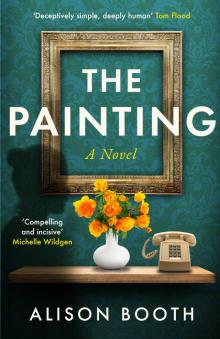 The Painting
The Painting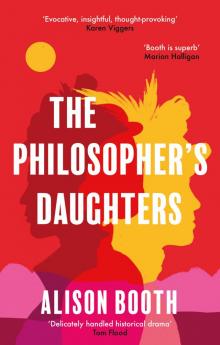 The Philosopher's Daughters
The Philosopher's Daughters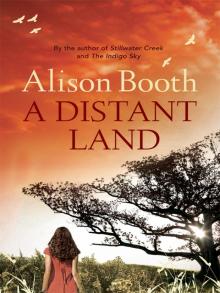 A Distant Land
A Distant Land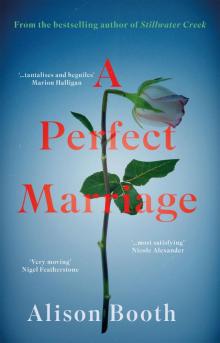 A Perfect Marriage
A Perfect Marriage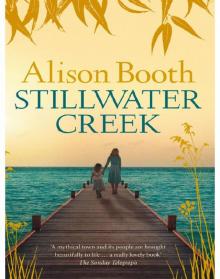 Stillwater Creek
Stillwater Creek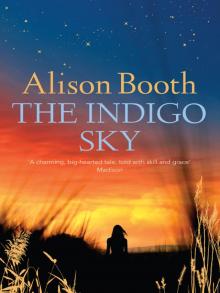 The Indigo Sky
The Indigo Sky